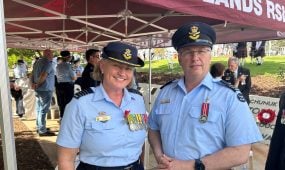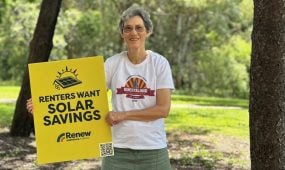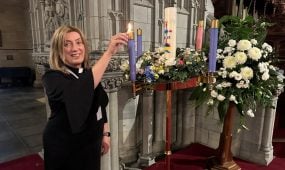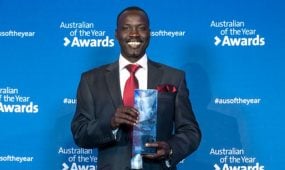Q&A with third-generation Anglican priest, The Rev’d Dr Hugh Begbie
Spotlight Q&A
Meet former Army chaplain and UQ college principal The Rev’d Dr Hugh Begbie and find out about his faith journey, favourite scripture, ministry, hobbies and childhood
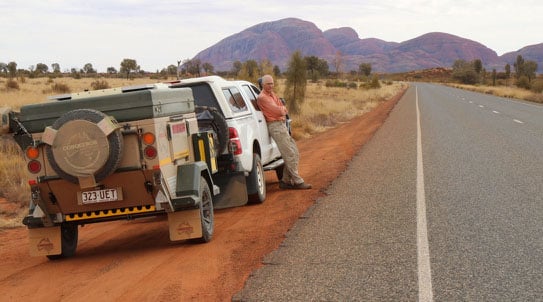
The Rev’d Dr Hugh Begbie is a dedicated locum in our Diocese – one of many retired priests in our Diocese who contribute significantly to ministry. When he is not locuming and travelling around Australia, he worships at St David’s, Chelmer.
How long have you been involved in the Anglican Church and in what roles?
I came from a dynastic Anglican family in Sydney. My grandfather, father and three uncles were all clergy in that Diocese, as was my brother. Following a stint as a National Service Army officer, I studied prior to ordination in 1976 in The Diocese of Armidale serving in Narrabri, Collarenebri and Armidale. In 1989, I returned to the Army as a Chaplain. In 1995 I was appointed Principal of Cromwell College at The University of Queensland where I remained until I retired in 2010. I am currently a locum priest in our Diocese and when not doing locum work, I worship at St David’s, Chelmer.
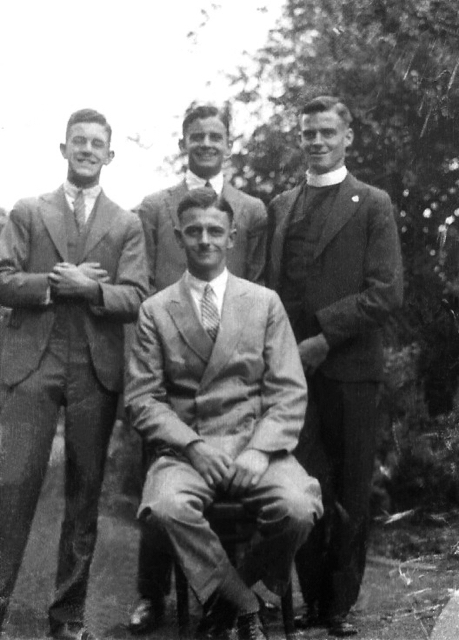
Hugh’s father and uncles all became clergy
What projects and activities are you currently working on in this role?
I will be beginning a new locum role at the end of January. I am also Chair of Mathew Hale Public Library, a Christian Trust Fund dedicated to ‘resourcing, promoting and encouraging leaders in the Anglican Province of Queensland to exercise ministry shaped by a clear understanding of biblical truth.’ In addition, I volunteer weekly as a Chaplain for the Wesley Hospital.
Advertisement
What have been the highlights of your Anglican Church roles so far?
My time as a University Chaplain in Armidale was the highlight, while my role as Principal at Cromwell hopefully left an enduring mark on many lives. I enjoy locum work. Not only does it provide an opportunity to serve God and help others, but it encourages me personally. As a widower, I value the support and friendship of God’s people. One story illustrates how faith can affect all we do. While Principal, I had one international student who had a real chip on his shoulder. He was always getting drunk and causing problems. One day in a drunken rage he not only annoyed all the students, but verbally abused me. When the time came for discipline, I instead took him out to lunch and shared with him man to man. That act of grace was the beginning of a changed life.
What are your plans and goals for the next 12 months?
In the next 12 months, I will be locum at The Parish of Noosa from the end of January to the end of June. Following this, I will be embarking on another trip around Australia. This year I travelled 27,000 km, including travelling right through the centre of the country. It seems to me that, while I have the strength, I should take the opportunity to explore this wonderful land.
Advertisement
Can you tell us a little about your personal faith journey?
I have been a believer all my life. There have been challenges, not so much to my faith but in living life and my faith well. Perhaps the most difficult time began in 2000 when my wife Helen was diagnosed with bowel cancer. After surgery and chemo, it eventually returned and I nursed her at home until she died in my arms in December 2002. The journey since has been tough. Living alone has been hard and left me feeling vulnerable and at times broken. Having a great family and Christian support around me have been wonderful but have not removed the primal void in my life – the emptiness that comes from losing my wife and best friend. Everyone suffers at some point, but the difference for Christians is that we know that with the cross comes the resurrection, and while bad things remain bad things, God can use those bad things for good outcomes, such as helping others. I have found comfort in this gracious truth as well, as in the support of friends and family.
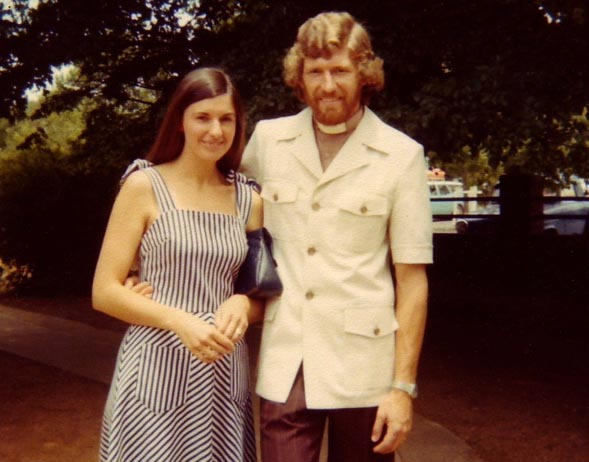
Hugh and wife Helen after Hugh’s 1976 ordination
How does your faith inspire you and shape your outlook, life choices and character?
My faith is at the centre of everything I do. I don’t always live up to my calling, but I know that ultimately, I am not only supported by God’s most surprising and wonderful grace, but I am called upon to live my life as Jesus lived his. This is an ongoing commitment and at times feels like a battle, requiring me to seek forgiveness and renewed strength to begin another day.
What is your favourite scripture and why?
My favourite scripture varies, but one I will share with you is the shortest one in the New Testament, ‘Jesus Wept’. I love this verse as it reminds me that I serve a God who not only cares for me (and you) in the strange mix of wonder and brokenness of our lives, but he knows how to weep in, for and with our brokenness. We believe in a God who, in the incarnation of his Son, has entered the full darkness and mortality of the world embracing it on the cross and then conquering it in the resurrection. In that extraordinary gift of shared suffering and hope, I find joy and strength to live and love.
What person of faith inspires you the most and why?
Many people have inspired me, but I will tell you about one couple I knew. I only ever saw them once a year when I was collecting gear for a Beach Mission I led at Hawksnest north of Newcastle. They spoke very pious language (which is definitely not me) but their love and hospitality were overwhelmingly beautiful and their love has left an enduring impact on me.
What are the primary strengths of the Church and what is the best way to make the most of these for the benefit of our communities?
The Church consists of those who follow Jesus, believers who gather each week to be strengthened by the Word through prayer and fellowship and then encouraged to go into the world as God’s little lights in the darkness. That is what it should be and that is what we should be seeking. Unfortunately, that is not what it always is because we do not always live up to our calling. At its best, it is the one place that people of all backgrounds can meet, experience grace and communally worship God. At its worst, it is legalistic or compromised in its teaching or behaviour as we have tragically seen in the terrible child abuse investigated by the Royal Commission.
What are the primary challenges currently encountered by the Church and what is the best way to overcome these for the benefit of our communities?
The Christian faith, or at least the Church, is being challenged from outside, and there are also serious internal divisions. To make matters worse we live in a victim culture that can make any form of debate difficult. In this kind of culture if you don’t agree with me, you are automatically my enemy. Maybe in this environment we should enter into conversation from a more personal basis, being prepared to share our own journeys, struggles and vulnerabilities, rather than merely debating. Maybe, just maybe, this will help to take the edge off the tribal mindset that dominates currently.
What is the kindest gesture you have ever received or witnessed?
I have witnessed many kind gestures. There was a couple who walked with me, literally as well as metaphorically, during the worst of my grief. Another important moment was when acapella group, The Idea of North, came and sang around my dying wife’s bed. ‘Amazing Grace’ takes on real power in the face of death. A third was when my home group held a makeshift ‘Lord’s Supper’, breaking of bread and wine around the same bed. My wife was too weak to partake, but the power of that moment will never be forgotten.
What do you do in your free time to recharge and relax?
I walk and ride my bike a lot. I love photography, mainly on my travels, as well as live theatre and reading. I just finished reading Anna McGahan’s autobiography, Metanoia and the fascinating discussion on the fine tuning of the universe called A Fortunate Universe by Geraint F Lewis and Luke A Barnes, both astro-physicists.
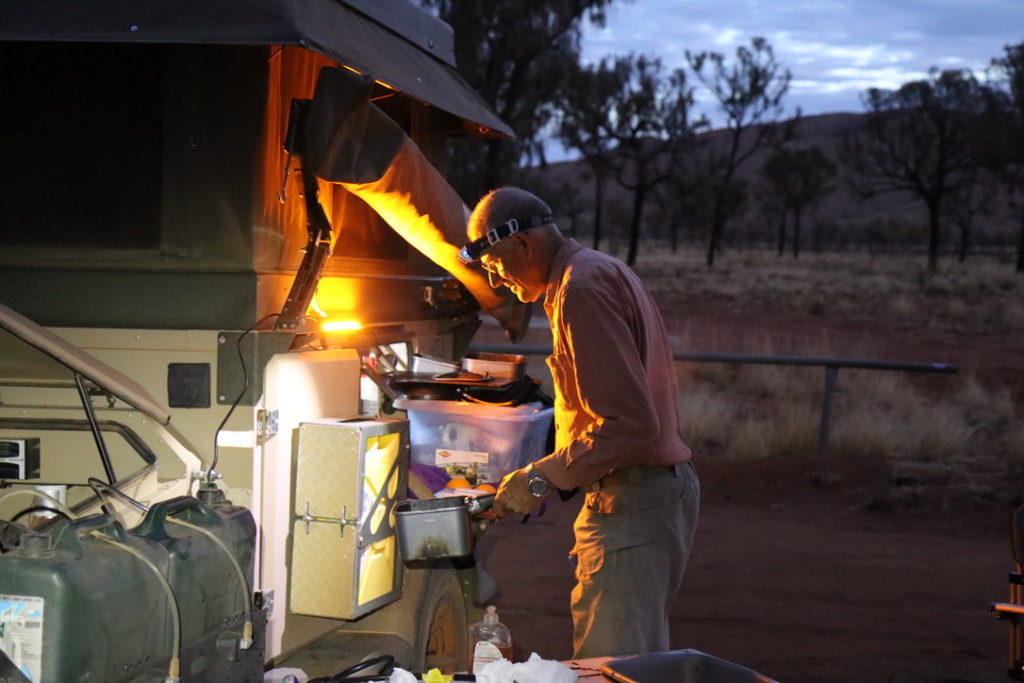
Hugh cooking up a storm on one of his camping trips in Kaltukatjara (Docker River) south west of Alice Springs
If you found yourself on a deserted island, what three things would you choose to have with you?
Water, food, company and an EPIRB. Oh, and of course, a Bible and a few other good books.
If you could have a billboard with any text on it, what would it say and why?
‘Seek the Lord while he may be found, call on him while he is near’ (NRSV). The incarnation we remember at Christmas and the whole story of Jesus leading to his death and resurrection is the moment God came near. John tells us that ‘The Word became flesh and made his dwelling among us’, which really means that God set up his holy of holies, his tabernacle among us with his presence and glory now being made human and visible in Jesus.
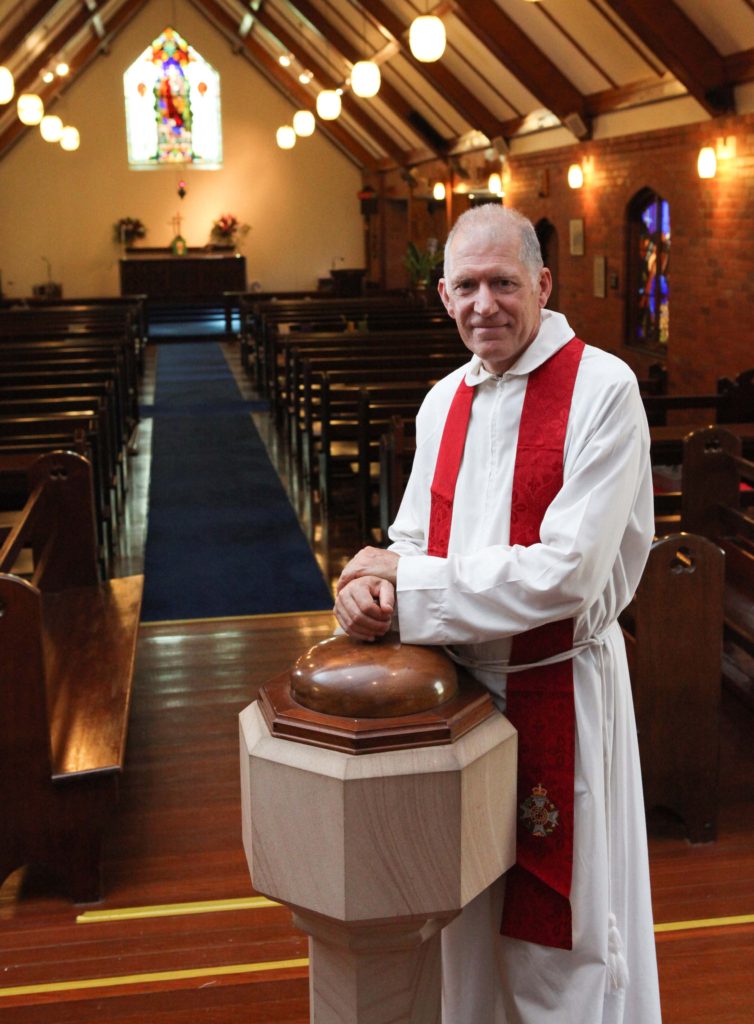
Hugh locuming in The Parish of Chelmer-Graceville in 2011
Where do you do your best thinking?
When I am walking or riding.
What keeps you up at night and what gets you out of bed in the morning?
I sleep well – nothing keeps me up. I believe in living well until you die, so I get up in the morning and just do stuff. I don’t do home alone very well so I do need to get out and be active to keep sane and more or less on track.
What’s your best childhood memory?
Holidays in Gerringong with my family. I remember running, swimming and hiding in the cliffs at Boat Harbour. I also remember the joy of being physically strong, which for me bought a kind of transcendent joy. While I’m still fit for my age (70), the tide has gone out a long way and I look on that with loss and sadness, but also thankfulness for what I have had and hope also in the resurrection.
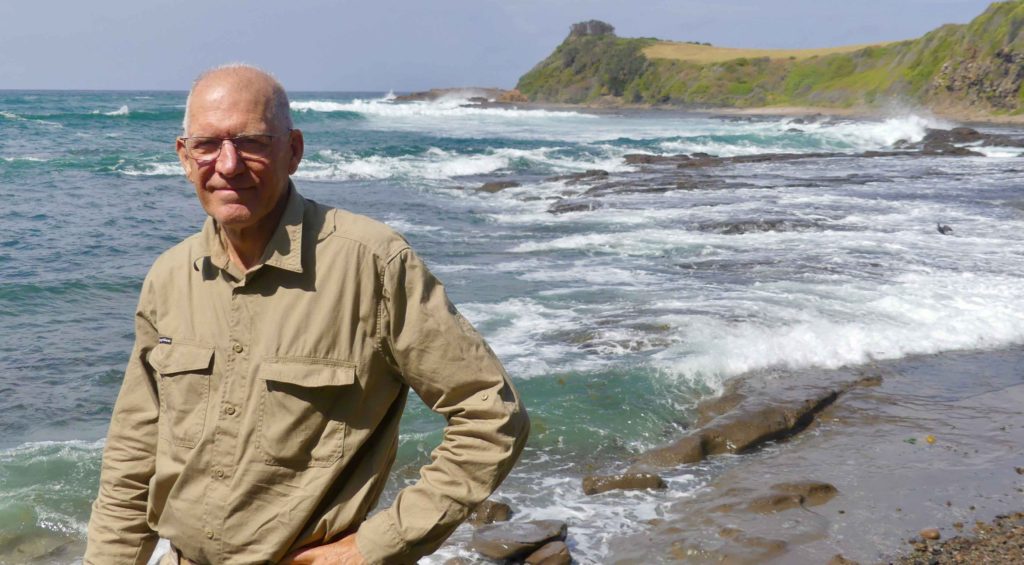
Hugh reminiscing about his childhood adventures in Boat Harbour, Gerringong
If you are having a bad day, what do you do to cheer yourself up?
I have never been a moody or depressed person, but I have days when I feel alone. When I feel like this, if I’m not doing voluntary work or some other activity I get out and walk, ride, watch a movie or visit friends.
What is the funniest thing that has happened to you recently?
Related Story
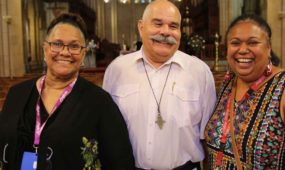 News
News
Clergy aged 65+ wellbeing and contribution survey
Recently I met a young man who was the spitting image of a person I knew 40 years ago – it was like being sucked back in time. The young man turned out to be the son of the friend, but I have never seen a son look so much like his father. It was a kind of breathtaking moment that left me stunned.
What makes you nostalgic and why?
Apart from the obvious loss of my wife and the joy of married life, as previously mentioned I miss being as strong, fit and fast as I was when I was younger. When I was 22, I ran up Masada near the Dead Sea, which is a sheer cliff with a goat track running up it. I did this in something close to 45-degree heat.
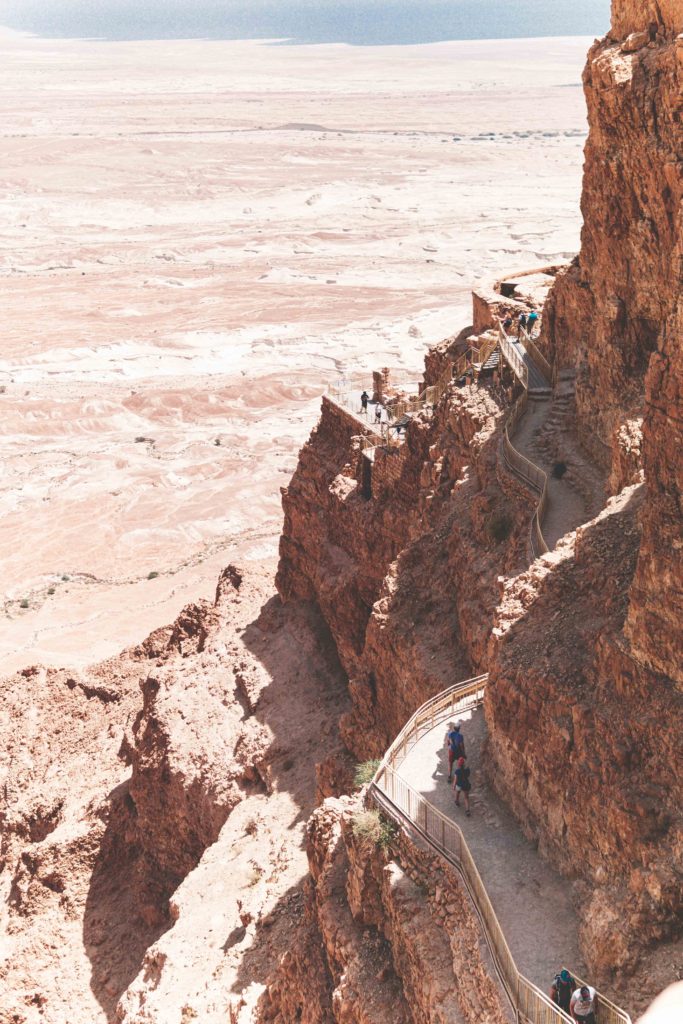
When Hugh was in his early twenties he ran up Masada, which is near the Dead Sea
What day would you like to re-live and why?
We all have regrets. There are days that would be nice to ‘undo’. As it’s not possible though, I am called to rely on forgiveness and the capacity of God to use even the messiness of my life for his glory.
What’s your unanswerable question – the question you are always asking yourself?
I have never been angry with God as I have always believed that we live in a broken world in which terrible things happen and people die. But that doesn’t stop me at times wondering why some things happen and what God does with prayers. I guess I find comfort in what Oz Guiness once said: “We do not always know why but we can know the God who knows why.”

